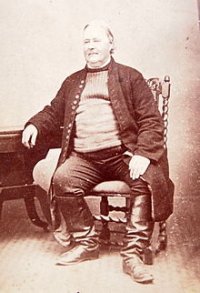
Web: www.robertstephenhawker.co.uk
Cornwall's eccentric poet
Robert Stephen Hawker was born in the vicarage of Charles Church, Plymouth on the 3rd of December 1803. When he was about ten years old his father, Jacob Stephen Hawker, took Holy Orders and left Plymouth to become curate of Altarnun, leaving him in the care of his grandparents. He was educated at Liskeard Grammar School, and when he was about sixteen he was apprenticed to a solicitor. He graduated from Oxford in 1828 and was ordained in 1831, becoming curate at North Tamerton and then, in 1834, vicar of the church at Morwenstow, where he remained throughout his life. He was a poet and collector of folklore. His most well known poem, which he wrote in 1824 "The Song of the Western Men", better known by its chorus ," And Shall Trelawny Die", is often called the Cornish National Anthem.
Hawker was acutely aware of the life-and-death importance of the harvest to his parishioners. In 1843 he introduced the Christian celebration of Harvest Festival that we know today. He invited his parishioners to a Harvest service on the first of October, when bread made from the first cut of corn was taken at communion. This was certainly an attempt to create a Christian replacement to the traditional feasting and heavy drinking which celebrated the end of the Harvest.
Parson "Hawker", as he was known to his parishioners, was something of an eccentric, both in his clothes and his habits. He loved bright colours and it seems the only black things he wore were his socks. He was often seen wearing a fisherman's jersey and wellington boots, walking the lanes with the huge pig he kept as a pet. He built a small hut from driftwood on the coastal cliff path overlooking the Atlantic Ocean, where he spent many hours writing his poems. Though eccentric, Hawker was much loved by his parishioners. He cared for his fellow human beings. Sailors drowned in shipwrecks were often buried on the beach where they were found, without Christian rites, for who could tell whether or not they were Christian men? Hawker, however, made sure that sailors drowned on the treacherous rocks near Morwenstow were given a Christian burial. He himself often made the steep and dangerous descent down the cliffs in order to recover the bodies. Hawker was happily married twice to two very different women. When only twenty he married Charlotte I'Ans, a lady much older than himself, who died in 1863. The following year he married Pauline Kuczynski, aged twenty. They had three daughters, Morwenna Pauline Hawker, Rosalind Hawker and Juliot Hawker. He died on the 15th August 1875 and is buried in Plymouth.
Bude Cornish National Anthem Famous Cornish People The Coastal Footpath
Smuggling in Cornwall Hawker's Hut